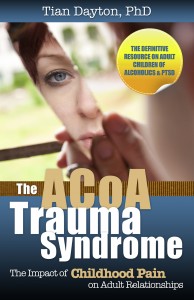
Dr. Dayton is the Director of the New York Psychodrama Training Institute, a certified trainer and Editor-in-Chief of Journal of Psychodrama, Sociometry and Group Psychotherapy. A prolific author, her most recent release is The ACoA Trauma Syndrome and Emotional Sobriety.
Who doesn’t self-medicate, at least a little? Sinking into a plate of pasta and a glass of wine or chowing down on French fries after a stressful day really does work to smooth out the rough edges and give us that “ahhhh” feeling. But when does this sort of behavior cross that invisible line between normal mood management to something that might become self-destructive? And why do these activities work to make us feel so good? When we don’t understand how certain substances and behaviors play with our body chemistry and set us up for compulsivity, we’re at risk for perpetuating lifestyles that slip into self-medication. We get stuck in hidden addictions.
Compulsive behaviors take hold in the brain because they are highly rewarded; they work with our own brain chemistry to make us feel good, but when we overuse these feel-good chemicals we can head straight into what psychologists call “process addictions” or a compulsive relationship with an activity (like eating or sex, spending, gambling, overworking, etc.).
Food and certain behaviors like sex can work to alter brain chemistry because they can have an analgesic effect similar to drugs or alcohol. According to Bart Hoebel, a psychologist at Princeton University, “Highly palatable foods and highly potent sexual stimuli are the only stimuli capable of activating the dopamine system (reward circuitry of the brain) with anywhere near the potency of addictive drugs.” Read More, http://www.freerepublic.com/focus/news/847022/posts . But then the crash comes. When dopamine levels, which have a calming effect on us, drop after a food binge or orgasm, depression sets in and then we need more food or more sex to get the burst of mood-altering dopamine back. Certain foods affect dopamine levels, and when we overuse them we’re taking that first step toward a process addiction.
Self-medicating takes hold when we compulsively use a substance or behavior to manage and control moods and mental states that we cannot cope with on our own. It happens like this: We have a desire to feel better, and we discover that a certain action leads to the satisfaction of that desire. The more consistently that particular action leads to the state we want to achieve, the more we want to do it. Alcohol and drugs are common mood managers. They are reliable. We learn how many drinks or which drugs work best to achieve the result we want. So, we’re discovering, are food and sex — because of the brain chemicals they stimulate.
Emotional Eating: Feeding Our Feelings
It is estimated that fourteen million people are affected by an obsessive, compulsive, or disordered relationship with food. Listen to Jenni Schaeffer, author of Life Without Ed, describe how chasing her own dopamine high to avoid feeling her depression led her down a desperate path toward a compulsive relationship with food and binge eating.
“After restricting food for days, I really needed energy. I dared to try an apple. I knew this would lead to eating more and more. Of course, it did. I started baking and bingeing … I drove to a vending machine at my apartment complex, and it was empty. So I drove my car to a nearby convenience store at 2:00 a.m. Would it still be open? How much money would I have to spend? Realizing I did not have enough money or my cell phone, I went back to my apartment to get both. Then I drove 20 minutes to a fast-food restaurant that is open 24 hours. I ordered lots of food at the drive-through and ate it in less than 30 seconds. A guy came running out of the store yelling something at me. Did he know what I was doing? … I know it’s not safe driving in my car at 2:30 a.m. with a missing a headlight and a bad engine. But I drove to another fast-food restaurant to get more food. What is wrong with me? I wouldn’t even eat dinner with Amy earlier today. But now, all I can do is eat. I have no control. I still need more food, but I can’t go back to the same drive-through. They will recognize me. So I drive — now at 3:30 a.m. — 45 minutes to a 24-hour grocery store. I buy lots of food that I had avoided eating earlier in the week. (I bought the exact candy that my boyfriend had offered to me and that I had refused.) My binges always equal everything I normally won’t let myself touch at all. Finally, I am satisfied. That anxious feeling is gone. I drive home. I try to throw up twice. (I’m never very successful at this.) I am depressed. I feel isolated from my mom and dad, Amy, my boyfriend, and every-one. I don’t want anyone to ask me about my eating. I have to avoid everyone so that they won’t ask. How did it get like this? I feel fat. I don’t want to eat again. My life is unmanageable because of food. But what do I do? I feel helpless and fat. I can’t break the cycle. I just want to break the cycle.I know what I can do. I won’t eat tomorrow.”
A study from Scripps Research Institute headquartered in La Jolla, Calif., published in Nature Neuroscience on March 28, 2010, found that junk food, or foods high in white sugar, white flour, and unsaturated fats, can be as addictive to the brain as cocaine, as it causes similar changes in the brain and sets up cravings for more junk food. In lab tests, rats given unlimited access to high-calorie foods like candy bars and cheesecake not only became obese very quickly, they continued gorging even when this bingeing behavior led to an electric shock. Obese rats that had their junk food replaced with a healthy diet actually stopped eating completely because the reward system in the rats’ brains changed when they became compulsive eaters. “What we’re seeing in our animals is very similar to what you’d see in humans who overindulge,” says lead researcher Paul J. Kenny, an associate professor of molecular therapeutics at the institute. “It seemed that it was okay, from what we could tell, to enjoy snack foods, but if you repeatedly overindulge, that’s where the problem comes in.” Repeated indulgence in junk food changes the brain chemistry to want that soothing, oblivious high, or what amounts to self-medicating, so that the brain and body actually become locked into an addictive cycle that is similar to that of a cocaine addict.
The desire to manage compulsive behaviors or an inner world that is out of balance reflects a self-affirming step toward personal growth and greater self-awareness. It’s what recovery is all about. It is important that we understand that these behaviors developed slowly and over time. And that some of the issues that we are avoiding or self-medicating may have begun as far back as our childhoods. It is equally important to understand that our solutions will be slow and require long-term commitment, and to understand that commitment itself will become its own reward — developing each day in us a little more patience, self-awareness, self-love, acceptance, and comfort living in our own skin.
Once we understand that self-medication is an unconscious attempt to manipulate our own body chemistry to feel more pleasure and less pain, to keep our own foot on the “dose delivery” pedal, we can flip it on its head. We can learn to manipulate our body chemistry in self-constructive — rather than self-destructive — ways.
Watch a Clip on Youtube of Tian Dayton, PhD discussing her new book, ACoA Trauma Syndrome
1. According to Bart Hoebel, a psychologist at Princeton University, “Highly palatable foods and highly potent sexual stimuli are the only stimuli capable of activating the dopamine system (reward circuitry of the brain) with anywhere near the potency of addictive drugs.”
• Hoebel, B. G., N. M. Avena, and P. Rada. 2009. “Sugar Versus Fat Bingeing: Notable Differences in Addictive-like Behaviors.” The Journal of Nutrition 139(3): 623–625 doi: 10.3945/ jn.108.097584
2. It is estimated that fourteen million people are affected by an obsessive, compulsive, or disordered relationship with food.
• EDC Eating Disorders Coalition for Research, Policy & Action
300, 720 7th Street Northwest Washington, DC 20001 P: (202) 543-9570
3. A study from Scripps Research Institute headquartered in La Jolla, California, published in Nature Neuroscience on March 28, 2010, found that junk food, or foods high in white sugar, white flour, and unsaturated fats, can be as addictive to the brain as cocaine, as it causes similar changes in the brain and sets up cravings for more junk food.
• Johnson, Paul M.; Kenny, Paul J. (2010). “Addiction-like reward dysfunction and compulsive eating in obese rats: Role for dopamine D2 receptors”. Nature Neuroscience 13 (5):
4.What we’re seeing in our animals is very similar to what you’d see in humans who overindulge,” says lead researcher Paul J. Kenny, an associate professor of molecular therapeutics at the institute.
• Johnson, Paul M.; Kenny, Paul J. (2010). “Addiction-like reward dysfunction and compulsive eating in obese rats: Role for dopamine D2 receptors”. Nature Neuroscience 13 (5): 635–41. doi:10.1038/nn.2519. PMC 2947358. PMID 20348917.
Tian Dayton, MA, PhD, TEP, is the Director of the New York Psychodrama Training Institute and the Program Development for Breathe Life Healing Centers and executive editor of the Journal of Psychodrama, Sociometry and Group Psychotherapy. She serves on the board of the National Association for Children of Alcoholics and is the author of 15 books. Dr. Dayton is the creator of the Internet's first interactive self-help website, www.emotionexplorer.com. Learn more at www.tiandayton.com.

